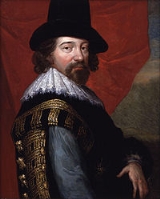
(22 January 1561 – 9 April 1626) was an English philosopher, statesman
, scientist, lawyer, jurist
, author and pioneer of the scientific method. He served both as Attorney General
and Lord Chancellor
of England. Although his political career ended in disgrace, he remained extremely influential through his works, especially as philosophical advocate and practitioner of the scientific method
during the scientific revolution
.
Bacon has been called the father of empiricism
.
The monuments of wit survive the monuments of power.![]()
Nam et ipsa scientia potestas est.![]()
Aristotle... a mere bond-servant to his logic, thereby rendering it contentious and well nigh useless.![]()
I do plainly and ingenuously confess that I am guilty of corruption, and do renounce all defense. I beseech your Lordships to be merciful to a broken reed.![]()
Lucid intervals and happy pauses.![]()
Nil terribile nisi ipse timor.![]()
Riches are a good handmaid, but the worst mistress.![]()
Audacter calumniare, semper aliquid haeret.![]()
I bequeath my soul to God... My body to be buried obscurely. For my name and memory, I leave it to men's charitable speeches, and to foreign nations, and the next age.![]()

